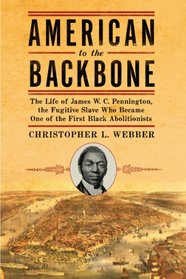Search -
American to the Backbone: The Life of James W. C. Pennington, the Fugitive Slave Who Became One of the First Black Abolitionists
American to the Backbone The Life of James W C Pennington the Fugitive Slave Who Became One of the First Black Abolitionists
Author:
The incredible story of a forgotten hero of nineteenth century New York City--a former slave, Yale scholar, minister, and international leader of the Antebellum abolitionist movement. — At the age of 19, scared and illiterate, James Pennington escaped from slavery in 1827 and soon became one of the leading voices against slavery prior to the Civ... more »
Author:
The incredible story of a forgotten hero of nineteenth century New York City--a former slave, Yale scholar, minister, and international leader of the Antebellum abolitionist movement. — At the age of 19, scared and illiterate, James Pennington escaped from slavery in 1827 and soon became one of the leading voices against slavery prior to the Civ... more »
ISBN-13: 9781605981758
ISBN-10: 1605981753
Publication Date: 7/15/2011
Pages: 432
Rating: ?
ISBN-10: 1605981753
Publication Date: 7/15/2011
Pages: 432
Rating: ?
0 stars, based on 0 rating
Publisher: Pegasus
Book Type: Hardcover
Other Versions: Paperback
Members Wishing: 0
Reviews: Amazon | Write a Review
Book Type: Hardcover
Other Versions: Paperback
Members Wishing: 0
Reviews: Amazon | Write a Review
Genres:
- Biographies & Memoirs >> Historical >> United States
- History >> Americas >> United States >> 19th Century




